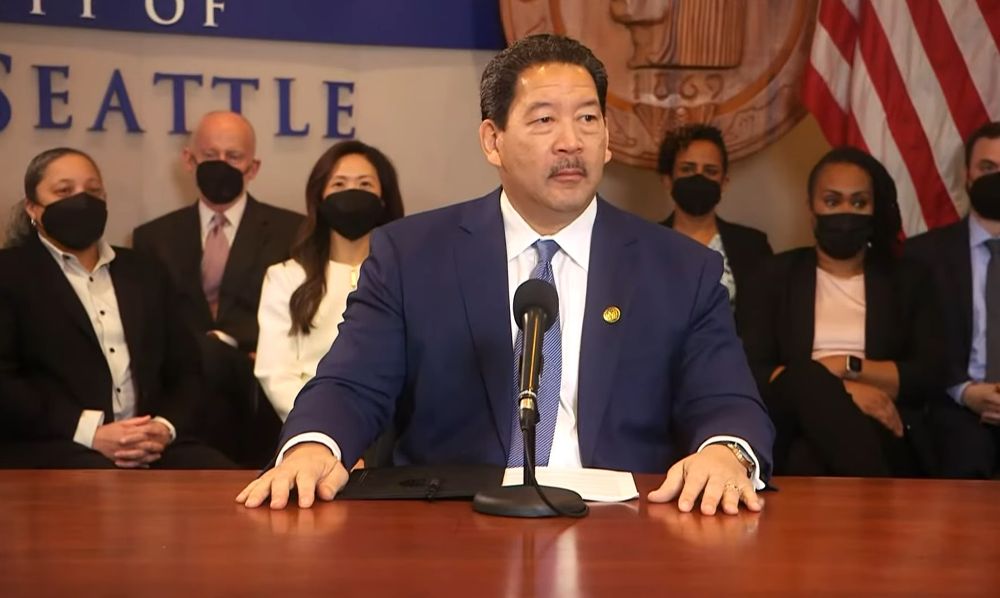His speech outlined his vision: “One Seattle,” and named many priorities and goals. As an opening salvo, it’s useful for him to broadcast that his goal, at least, an to move on from acrimony, and toward a better tone. But sadly, this won’t be up to him alone; the question will be more what his posture will be when he starts receiving some of that acrimony.
Soon, of course, Harrell will enter a time of serious prioritization, but that was not today, nor do I think this was his main goal with the speech. (Tony elaborated on this very well in my view; I fully agree.) A big part of executive governance is about resource allocation; doing more of A often means you do less of B or C. This was not a speech of “No,” it was a speech of tone-setting of “Yes, and…”
Above all, Harrell clearly seeks a reset from a period of division and conflict, and most of the speech was trying to lay groundwork for a new approach and new attitude. His primary goal for the speech was to try to set a new tone; I think that’s a necessary first step, and I don’t fault him for taking that approach.
If someone unfamiliar with Seattle’s past five years were handed such a speech by an incoming mayor, they would immediately infer the time that preceded it was full of demagoguery, conflict, violence, and an abandonment of the fundamentals of municipal governance. “My god,” they might say, looking at such emphasis on blocking-and-tackling issues that most other cities’ residents likely take for granted, “what happened here?”
Just a few weeks into his administration; “and” still seems possible, even though Harrell is no newcomer to city governance. But he’s wise to take an optimistic, can-do tone; we need that as a city, especially as we emerge from two years of pandemic and strife. Harrell talks about the power of “and”, and wants to establish a tone of unity and conversation, rather than division and conflict.
We will get our first glimpses into the strength of “No, we will not” via the upcoming budget process. Harrell and (City Council budget committee chair) Mosqueda are already eyeing the $31 million surplus being brought in by the JumpStart tax. Harrell will want to reallocate this surplus to general fund or other spending… or to offset unexpected expenses like the West Seattle Bridge, whereas Mosqueda (lead advocate of the JumpStart tax) will want to allocate much of it to affordable housing and home ownership, Green New Deal and BIPOC progressive program investments.
[Debbie Downer would note two cautions to this surplus. First, companies paying these higher taxes are also likely to be feverishly looking for ways to shift higher-wage employees to remote or the Eastside, where the tax won’t apply. And the $31 million surplus from the JumpStart tax is about 15% over the estimate, yet 7.5% inflation has already claimed half of that increase.]
He’s got several major goals: improve public safety (hire 125 new officers, adding a Unit 3 for response to those in crisis), invest in good governance (potholes, parks available to the public, bridge repair and more), tackle homelessness via the regional authority and state resources, and more.
He gave a nod to pretty much all city leaders, including the new City Attorney Ann Davison. Overall, small business, public safety and homelessness got more mention than in prior years, which was refreshing having these areas be underrepresented in recent years past.
Regarding homelessness, notably absent was a clear expression of diagnosis, or discussion of root cause: is it primarily about addiction and mental health, or is it driven primarily by affordability? That is, if we had to choose, which ones should we tackle first? “And” works rhetorically, up until the budget cells need to be filled in. Luckily for Harrell, the Regional Homelessness Authority is most on-point for this vs. city council, and he can perhaps establish a more collaborative approach. Perhaps.
Harrell was reluctant to take on the existing narrative that homelessness has been driven almost exclusively by affordability. Notably, the words “addict”, “drugs”, “methamphetamine” and “addiction” showed up a total of once in his 10-page speech. Then again, affordable housing only got one reference as well. Some of us think that progress will be slow until we can squarely look at addiction as the crisis that it is, and be prepared to say the words “methamphetamine”, “opioids” and “treatment” just as often as “housing.”
He did mention that we need to hire more people for mental health and addiction, but largely deferred to the regional homelessness authority, with a nod to Councilmember Lewis.
I thought it was the right approach to start with optimism and a signal of collaboration. One Seattle seems like such a nice place.
Discover more from Post Alley
Subscribe to get the latest posts sent to your email.

It wouldn’t be a huge surprise if Harrell’s administration also features “demagoguery, conflict, violence, and an abandonment of the fundamentals of municipal governance.” Harrell was the candidate of the same interest groups that backed the candidacies of Nickels, Murray, and Durkan. The reasons for the discords in the recent past still exist because the same voices drown out the others in city hall.